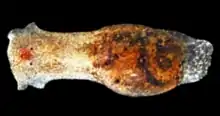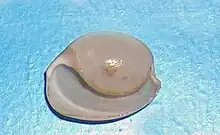| Haminoea | |
|---|---|
 | |
| live Haminoea sp. | |
.JPG.webp) | |
| A shell of Haminoea zelandiae | |
| Scientific classification | |
| Domain: | Eukaryota |
| Kingdom: | Animalia |
| Phylum: | Mollusca |
| Class: | Gastropoda |
| Subclass: | Heterobranchia |
| Order: | Cephalaspidea |
| Superfamily: | Haminoeoidea |
| Family: | Haminoeidae |
| Genus: | Haminoea Turton & Kingston in Carrington, 1830[1] |
| Type species | |
| Bulla hydatis Linnaeus, 1758 | |
| Synonyms<[2] | |
| |
Haminoea is a genus of medium-sized sea snails or bubble snails, marine opisthobranch gastropod molluscs in the family Haminoeidae, the haminoea bubble snails, part of the clade Cephalaspidea, the headshield slugs and bubble snails.[2]
Systematics
Three different spellings (Haminoea, Haminea, Haminaea) were used for this genus over two hundred years. The ICZN finally made a decision that the correct spelling is Haminoea.[2]
Oskars et al. (2019) restricted Haminoea to species from the Atlantic and eastern Pacific, and resurrected Haloa and Lamprohaminoea for Indo-Pacific species.[3]
Description
Many species within this genus have green algae growing on their shells. The posterior tip of the headshield is bilobed, except in Haminoea elegans.
Species
Species within the genus Haminoea include:
- Haminoea alfredensis P. Bartsch, 1915 - Distribution: South Africa, Length: 9–17 mm, Description: has a broad radular ribbon with about 40 teeth in each half row; translucent greenish color, dotted with yellow to orange spots.
- Haminoea ambigua (A. Adams, 1850)
- Haminoea angelensis F. Baker & G. D. Hanna, 1927 - Distribution: Gulf of California, Mexico, Length: 7 mm.
- Haminoea antillarum d'Orbigny, 1841 - Antilles Glassy-bubble, Antilles Paper-bubble - Distribution: Florida, Caribbean, Brazil. Length: 12–20 mm.
- Haminoea antillarum guadaloupensis Sowerby II, 1868 - Distribution : Florida, Cuba, Guadeloupe, Length: 12–18 mm, Description: globose shell with greenish yellow color, covered with longitudinal striae (= stripes); mantle with white to greenish background with small black dots.
- Haminoea binotata Pilsbry, 1895
- Haminoea cyanocaudata Heller & Thompson, 1983
- Description : translucent with green color (caused by growths of green algae), mottled with lightbrown spots, outlined in white, and darker brown dots; There can be a wide variation in the color pattern. This species is fairly uncommon, but, when found, it is always in large aggregations.
- Haminoea cymbiformis Carpenter, 1856
- Distribution : Mexico
- Haminoea elegans Gray, 1825 Atlantic Elegant Paper Bubble; Elegant Glassy Bubble
- Distribution : West Africa, Florida, Caribbean, Venezuela, Colombia, Brazil
- Length : 23.5 mm
- Description : found at depths up to 34 m; translucent mantle with patches of brown and black; posterior end of the headshield is not bilobed; shell with spiral grooves.
- Haminoea exigua Schaefer, 1992
- Haminoea flavescens (A. Adams, 1850)
- Haminoea fusari Alvarez, E.F.García, & Villani, 1993
- Haminoea fusca Pease, 1863
- Distribution : Indo-Pacific
- Length : 25 mm
- Description : color of the shell : varies from greenish to brown, and light purple.
- Haminoea galba W. H. Pease, 1861
- Distribution : Indo Pacific
- Haminoea glabra A. Adams, 1850
- Distribution : Yucatán, Panama
- Length : 4.3 mm
- Haminoea hydatis Linnaeus, 1758
- Distribution : SW Britain, Ireland, France and south to the Mediterranean, Madeira and Canaries; Ascension Island, St. Helena, west coast of Africa
- Length : 8–30 mm (shell : 15 mm)
- Description : fragile shell hidden by the mantle and parapodial lobes in crawling animals. Herbivorous swimming dark brown snail found on muddy sands, shell grit and algae fields, down to unknown depths.
- Haminoea japonica Pilsbry, 1895
- Haminoea margaritoides Kuroda & Habe, 1971 - Distribution: Japan, Length: 7 mm

- Haminoea navicula da Costa, 1778 - Distribution: SW Britain, south to the Mediterranean, Ascension Island, St. Helena; Atlantic and Mediterranean costas of France and Spain; Black Sea, Length: up to 70 mm (shell: 32 mm), Description: larger species, with heavier and darker-white shell; cephalic shield with short tentacular processes at front. Found on muddy sands especially among Eelgrass, Zostera marina. Does not swim. This species is able to change its color to correspond with its environment. The color pigments (or melanophores) in the skin can be obscured. The skin color can change in this way from dark brown to white in four to five hours. (Edlinger, Malacologia 22; 1982)
- Haminoea orbignyana A. de Férussac, 1822
- Distribution : France to West Africa; Mediterranean, Eastern Atlantic
- Length : 7 mm
- Haminoea orteai F. G. García Talavera, Murillo, & Templado, 1987
- Distribution : Southern Spain
- Haminoea padangensis Thiele, 1825 Padang’s Delicate Bubble
- Distribution : West-Pacific
- Length : 11 mm
- Haminoea peruviana d'Orbigny, 1842
- Distribution : Peru
- Length : 11 mm
- Haminoea petersi (Martens, 1879)
- Haminoea petitii d'Orbigny, 1841 Straight Glassy-bubble
- Distribution: Caribbean, Florida, Colombia, Brazil
- Length : 12 mm
- Haminoea solitaria T. Say, 1822 Solitary Glassy-bubble, Say’s Paper-bubble, Solitary Paper-bubble
- Distribution : Canada, Massachusetts to Florida
- Length : 8–19 mm
- Description : common bubble snail; oblong smooth shell; bluish-white to yellowish-brown.
- Haminoea succinea (T.A. Conrad, 1846) Amber Glassy-bubble
- Distribution : caribbean, Florida, Colombia, Venezuela, Bermuda
- Length : 12 mm
- Haminoea templadoi Garcia, Perez-Hurtado & Garcia-Gomez, 1991
- Haminoea tenella (A. Adams in Sowerby, 1850)
- Haminoea tenera A. Adams, 1850
- Distribution : Australia
- Haminoea vesicula A. A. Gould, 1855 Blister Glassy-bubble, White Paper-bubble, Gould’s Paper-bubble
- Distribution : West America, Alaska, Gulf of California, Mexico
- Length : 19 mm
- Description : common on muddy flats and on eelgrass; the middle posterior part of the cephalic shield has an indent; brown or greenish-yellowy shell; large, barrel-shaped body whorl covered by a rust periostracum; involute (= sunken) spire; long aperture; outer lip gradually increasing in width; the snail cannot retract completely into its shell.
- Haminoea virescens Sowerby, 1833 Green Glassy-bubble, Green Paper-bubble, Sowerby’s Paper-bubble
- Distribution : Northwestern America from Puget Sound (Seattle) to Gulf of California.
- Length : 13–19 mm
- Description : Thin, fragile shell is ovate and yellowish-green; involute (= sunken) spire, with small perforation; body whorl with longitudinal growth ridges and minute grooves; large aperture; thin outer lip
- Haminoea wallisi Gray, 1825
- Distribution : Australia
- Distribution : New Zealand
- Length : 30 mm (shell : 20 mm)
- Description : very common; translucent snail with variable coloring, going from pale color with black dots, to a uniform black color; broad headshield; parapodia fold up and envelop most of the shell; thin, ovate translucent shell.
- Species brought into synonymy
- Haminoea angusta Gould, 1859:synonym of Cylichnatys angusta (Gould, 1859)
- Haminoea callidegenita (Gibson & Chia, 1989):synonym of Haminoea japonica Pilsbry, 1895 Distribution: West America, Description: has a deeply bifurcate headshield.
- Haminoea cornea (Lamarck, 1822):synonym of Haminoea navicula (da Costa, 1778)
- Haminoea crocata Pease, 1860:synonym of Haloa crocata (Pease, 1860)
- Haminoea curta A. Adams, 1850: synonym of Liloa curta (A. Adams, 1850)
- Haminoea cymbalum Quoy & Gaimard, 1833:synonym of Lamprohaminoea cymbalum (Quoy & Gaimard, 1833)
- Haminoea cymoelium Monterosato, 1917:synonym of Haminoea hydatis (Linnaeus, 1758)
- Haminoea cyanomarginata Heller & Thompson, 1983:synonym of Lamprohaminoea cyanomarginata (Heller & Thompson, 1983)
- Haminoea grisea E.A. Smith, 1875:synonym of Cylichna alba (Brown, 1827)
- Haminoea maugeansis Burn, 1966:synonym of Papawera maugeansis (Burn, 1966)
- Haminoea natalensis C. F. Krauss, 1848:synonym of Haloa natalensis (Krauss, 1848)
- Haminoea ovalis Pease, 1868:synonym of Haloa ovalis (Pease, 1868)
- Haminoea taylorae E. J. Petuch, 1987:synonym of Haminoea elegans (Gray, 1825)
- Haminoea zelandiae Gray, 1843:synonym of Papawera zelandiae (Gray, 1843)
References
- ↑ Turton W. (1830). In: Carrington. Teignmouth Guide, part 2, sign. F.8.
- 1 2 3 Bouchet, P.; Gofas, S. (2012). Haminoea. Accessed through: World Register of Marine Species at http://www.marinespecies.org/aphia.php?p=taxdetails&id=138054 on 2012-06-06
- ↑ Oskars, T. R. and M. A. E. Malaquias. 2019. A molecular phylogeny of the Indo-West Pacific species of Haloa sensu lato gastropods (Cephalaspidea: Haminoeidae): Tethyan vicariance, generic diversity, and ecological specialization. Molecular Phylogenetics and Evolution. 139.
Further reading
- Powell A. W. B. (1979). New Zealand Mollusca. William Collins Publishers Ltd, Auckland, New Zealand, ISBN 0-00-216906-1
- Pownall G. (1979). New Zealand Shells and Shellfish. Seven Seas Publishing Pty Ltd, Wellington, New Zealand 1979 ISBN 0-85467-054-8
- Vaught, K.C. (1989). A classification of the living Mollusca. American Malacologists: Melbourne, FL (USA). ISBN 0-915826-22-4. XII, 195 pp.
- Gofas, S.; Le Renard, J.; Bouchet, P. (2001). Mollusca, in: Costello, M.J. et al. (Ed.) (2001). European register of marine species: a check-list of the marine species in Europe and a bibliography of guides to their identification. Collection Patrimoines Naturels, 50: pp. 180–213
- Gofas, S.; Afonso, J.P.; Brandào, M. (Ed.). (S.a.). Conchas e Moluscos de Angola = Coquillages et Mollusques d'Angola. [Shells and molluscs of Angola]. Universidade Agostinho / Elf Aquitaine Angola: Angola. 140 pp.
- Willan, R. (2009). Opisthobranchia (Mollusca). In: Gordon, D. (Ed.) (2009). New Zealand Inventory of Biodiversity. Volume One: Kingdom Animalia. 584 pp
External links
- SEM images of the radula can be found at Thompson, T.E.; Bebbington, A. (1973). "Scanning electron microscope studies of gastropod radulae". Malacologia. 14: 147–165.